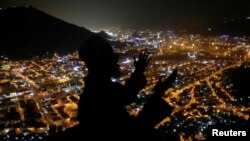MECCA —
Saudi Arabian authorities have asked pilgrims to put politics aside during the annual haj, but amid bitter divisions in Egypt, some Islamists refuse to keep quiet.
“What's happening in Egypt now is a disgrace, the army is killing innocent Muslims in cold blood every day,” said Zaghloul Hassanien, the owner of an oil products company in the Nile Delta town of Mansoura.
He was standing in a supermarket near the Grand Mosque in Mecca, the birthplace of Islam and focal point for the millions of Muslims flocking to the city for the annual rites, which start on Monday.
Keenly aware of the potential for political tensions to flare into violence at a time of upheaval across the Middle East, the Saudi Interior Minister Prince Mohammed bin Nayef on Wednesday asked pilgrims to leave disputes at home.
Bolstered security
He said the kingdom had drafted 95,000 members of the security forces to maintain order.
Sunni Muslim Saudi Arabia not only hosts the pilgrimage, but increasingly is involved in the conflicts across the region
The kingdom is embroiled in a region-wide contest with Shi'ite Iran for influence, as each side accuses the other of backing Syria's bloody civil war.
It also has given Egypt billions of dollars to help prop up the economy and support the generals who in July ousted a government led by Mohamed Morsi, a member of the Sunni Islamist movement the Muslim Brotherhood. Saudi leaders see the organization as a direct threat to their dynastic rule.
As demonstrations by Brotherhood supporters in Egypt are met by a crackdown by government forces, feelings are running high among pilgrims from the most populous Arab nation but they say they do not plan to cause unrest.
Mixed views
One fully veiled Egyptian woman said haj was not a place for politics, but, citing the hundreds of Brotherhood members killed in protests, she added that she would pray for God's vengeance to strike army chief General Abdel Fattah al-Sisi.
“Before coming to haj we agreed not to talk about politics to avoid any problems in this country,” said Mohammed Ramadan, 63, a retired government employee from the Egyptian Mediterranean city of Alexandria. “Islamic rule will prevail. God is Greatest.”
For other Egyptian pilgrims, Sisi represents a chance to restore the country's stability.
“In every prayer I say God bless Sisi, God give him the strength to protect us against these people that claim to be religious and who have no connection with Islam,” Mohammed Mahmoud Ahmed, a 36-year-old pilgrim from Aswan.
But most Egyptians making their way into the holy city said their most fervent prayers were for peace.
“Egypt was never like this: Now within a family you have one brother that supports Morsi and another that supports the army and they kill each other over these differences,” said Mosaad Moahmed Hamed, a 28-year-old pilgrim from Mansoura.
“I am praying to God in these holy days that Egypt will be united again. We are tired of hearing about people being killed every day,” he said.
“What's happening in Egypt now is a disgrace, the army is killing innocent Muslims in cold blood every day,” said Zaghloul Hassanien, the owner of an oil products company in the Nile Delta town of Mansoura.
He was standing in a supermarket near the Grand Mosque in Mecca, the birthplace of Islam and focal point for the millions of Muslims flocking to the city for the annual rites, which start on Monday.
Keenly aware of the potential for political tensions to flare into violence at a time of upheaval across the Middle East, the Saudi Interior Minister Prince Mohammed bin Nayef on Wednesday asked pilgrims to leave disputes at home.
Bolstered security
He said the kingdom had drafted 95,000 members of the security forces to maintain order.
Sunni Muslim Saudi Arabia not only hosts the pilgrimage, but increasingly is involved in the conflicts across the region
The kingdom is embroiled in a region-wide contest with Shi'ite Iran for influence, as each side accuses the other of backing Syria's bloody civil war.
It also has given Egypt billions of dollars to help prop up the economy and support the generals who in July ousted a government led by Mohamed Morsi, a member of the Sunni Islamist movement the Muslim Brotherhood. Saudi leaders see the organization as a direct threat to their dynastic rule.
As demonstrations by Brotherhood supporters in Egypt are met by a crackdown by government forces, feelings are running high among pilgrims from the most populous Arab nation but they say they do not plan to cause unrest.
Mixed views
One fully veiled Egyptian woman said haj was not a place for politics, but, citing the hundreds of Brotherhood members killed in protests, she added that she would pray for God's vengeance to strike army chief General Abdel Fattah al-Sisi.
“Before coming to haj we agreed not to talk about politics to avoid any problems in this country,” said Mohammed Ramadan, 63, a retired government employee from the Egyptian Mediterranean city of Alexandria. “Islamic rule will prevail. God is Greatest.”
For other Egyptian pilgrims, Sisi represents a chance to restore the country's stability.
“In every prayer I say God bless Sisi, God give him the strength to protect us against these people that claim to be religious and who have no connection with Islam,” Mohammed Mahmoud Ahmed, a 36-year-old pilgrim from Aswan.
But most Egyptians making their way into the holy city said their most fervent prayers were for peace.
“Egypt was never like this: Now within a family you have one brother that supports Morsi and another that supports the army and they kill each other over these differences,” said Mosaad Moahmed Hamed, a 28-year-old pilgrim from Mansoura.
“I am praying to God in these holy days that Egypt will be united again. We are tired of hearing about people being killed every day,” he said.





